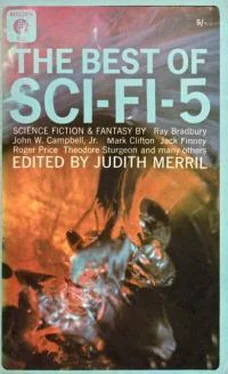The Best of Sci-Fi-5
Здесь есть возможность читать онлайн «The Best of Sci-Fi-5» весь текст электронной книги совершенно бесплатно (целиком полную версию без сокращений). В некоторых случаях можно слушать аудио, скачать через торрент в формате fb2 и присутствует краткое содержание. Год выпуска: 1966, Издательство: Mayflower-Dell, Жанр: Фантастика и фэнтези, на английском языке. Описание произведения, (предисловие) а так же отзывы посетителей доступны на портале библиотеки ЛибКат.
- Название:The Best of Sci-Fi-5
- Автор:
- Издательство:Mayflower-Dell
- Жанр:
- Год:1966
- ISBN:нет данных
- Рейтинг книги:3 / 5. Голосов: 1
-
Избранное:Добавить в избранное
- Отзывы:
-
Ваша оценка:
- 60
- 1
- 2
- 3
- 4
- 5
The Best of Sci-Fi-5: краткое содержание, описание и аннотация
Предлагаем к чтению аннотацию, описание, краткое содержание или предисловие (зависит от того, что написал сам автор книги «The Best of Sci-Fi-5»). Если вы не нашли необходимую информацию о книге — напишите в комментариях, мы постараемся отыскать её.
The Best of Sci-Fi-5 — читать онлайн бесплатно полную книгу (весь текст) целиком
Ниже представлен текст книги, разбитый по страницам. Система сохранения места последней прочитанной страницы, позволяет с удобством читать онлайн бесплатно книгу «The Best of Sci-Fi-5», без необходимости каждый раз заново искать на чём Вы остановились. Поставьте закладку, и сможете в любой момент перейти на страницу, на которой закончили чтение.
Интервал:
Закладка:
He said, “I understand.” Then, “What do you want me to do?”
Alto patted him on the shoulder. “Good boy. Believe me, you’ll be helping her in the long run. What I propose will save all of us from looking foolish. We’ve got to stand up to LeGrande, even if it means a one-way ticket out of V.C. Okay, Paul?” Merrill nodded firmly and he went on, “Orchestra will continue as scheduled. According to the program Madame Gioconda will be singing to an accompaniment by Opus Zero , but that means nothing and there’ll be no connection at any point. In fact she won’t turn up until the night itself. She’ll stand well down-stage on a special platform, and the only microphone will be an aerial about twenty feet diagonally above her. It will be live— but her voice will never reach it . Because you, Mangon, will be in the cue-box directly in front of her, with the most powerful sonovac we can lay our hands on. As soon as she opens her mouth you’ll let her have it. She’ll be at least ten feet away from you so she’ll hear herself and won’t suspect what is happening.”
“What about the audience?” Merrill asked.
“They’ll be listening to my symphony, enjoying a neurophonic experience of sufficient beauty and power, I hope, to distract them from the sight of a blowzy prima donna gesturing to herself in a cocaine fog. They’ll probably think she’s conducting. Remember, they may be expecting her to sing but how many people still know what the word really means? Most of them will assume its ultrasonic.”
“And LeGrande?”
“He’ll be in Bermuda. Business conference.”
5
Madame Gioconda was sitting before her dressing table mirror, painting on a face like a Halloween mask. Beside her the gramophone played scratchy sonic selections from Traviata . The stage was still a disorganized jumble, but there was now an air of purpose about it.
Making his way through the flats, Mangon walked up to her quietly and kissed her bare shoulder. She stood up with a flourish, an enormous monument of a woman in a magnificent black silk dress sparkling with thousands of sequins.
“Thank you, Mangon,” she sang out when he complimented her. She swirled off to a hat-box on the bed, pulled out a huge peacock feather and stabbed it into her hair.
Mangon had come round at six, several hours before usual; over the past two days he had felt increasingly uneasy. He was convinced that Alto was in error, and yet logic was firmly on his side. Could Madame Gioconda’s voice have preserved itself? Her spoken voice, unless she was being particularly sweet, was harsh and uneven, recently even more so. He assumed that with only a week to her performance nervousness was making her irritable.
Again she was going out, as she had done almost every night. With whom, she never explained; probably to the theater restaurants, to renew contacts with agents and managers. He would like to have gone with her, but he felt out of place on this plane of Madame Gioconda’s existence.
“Mangon, I won’t be back until very late,” she warned him. “You look rather tired and pasty. You’d better go home and get some sleep.”
Mangon noticed he was still wearing his yellow peaked cap. Unconsciously he must already have known he would not be spending the night there.
“Do you want to go to the stockade tomorrow?” he asked.
“Hmmmh … I don’t think so. It gives me rather a headache. Let’s leave it for a day or two.”
She turned on him with a tremendous smile, her eyes glittering with sudden affection.
“Good-by, Mangon, it’s been wonderful to see you.” She bent down and pressed her cheek maternally to his, engulfing him in a heady wave of powder and perfume. In an instant all his doubts and worries evaporated, he looked forward to seeing her the next day, certain that they would spend the future together.
For half an hour after she had gone he wandered around the deserted sound stage, going through his memories. Then he made his way out to the alley and drove back to the stockade.
As the day of Madame Gioconda’s performance drew closer Mangon’s anxieties mounted. Twice he had been down to the concert studio at Video City, had rehearsed with Alto his entry beneath the stage to the cue-box, a small compartment off the corridor used by the electronics engineers. They had checked the power points, borrowed a sonovac from the services section—a heavy duty model used for shielding VIP’s and commentators at airports— and mounted its nozzle in the cue-hood.
Alto stood on the platform erected for Madame Gioconda, shouted at the top of his voice at Merrill sitting in the third row of the stalls.
“Hear anything?” he called afterward.
Merrill shook his head. “Nothing, no vibration at all.”
Down below Mangon flicked the release toggle, vented a long drawn-out “Fiivvveeee! … Foouuurrr! … Thrreeeee! … Twooooo!… Onnneeee… !”
“Good enough,” Alto decided. Chicago-style, they hid the sonovac in a triple-bass case, stored it in Alto’s office.
“Do you want to hear her sing, Mangon?” Alto asked. “She should be rehearsing now.”
Mangon hesitated, then declined.
“It’s tragic that she’s unable to realize the truth herself,” Alto commented. “Her mind must be fixed fifteen or twenty years in the past, when she sang her greatest roles at La Scala. That’s the voice she hears, the voice she’ll probably always hear.”
Mangon pondered this. Once he tried to ask Madame Gioconda how her practice sessions were going, but she was moving into a different zone and answered with some grandiose remark. He was seeing less and less of her, whenever he visited the station she was either about to go out or else tired and eager to be rid of him. Their trips to the stockade had ceased. All this he accepted as inevitable; after the performance, he assured himself, after her triumph, she would come back to him.
He noticed, however, that he was beginning to stutter.
On the final afternoon, a few hours before the performance that evening, Mangon drove down to F Street for what was to be the last time. He had not seen Madame Gioconda the previous day and he wanted to be with her and give her any encouragement she needed.
As he turned into the alley he was surprised to see two large removal vans parked outside the station entrance. Four or five men were carrying out pieces of furniture and the great scenic flats from the sound stage.
Mangon ran over to them. One of the vans was full; he recognized all Madame Gioconda’s possessions—the rococo wardrobe and dressing table, the couch, the huge Desdemona bed, up-ended and wrapped in corrugated paper—as he looked at it he felt that a section of himself had been torn from him and rammed away callously. In the bright daylight the peeling threadbare flats had lost all illusion of reality; with them Mangon’s whole relationship with Madame Gioconda seemed to have been dismantled.
The last of the workmen came out with a gold cushion under his arm, tossed it into the second van. The foreman sealed the doors and waved on the driver.
“W … wh … where are you going?” Mangon asked him urgently.
The foreman looked him up and down. “You’re the sweeper, are you?” He jerked a thumb toward the station. “The old girl said there was a message for you in there. Couldn’t see one myself.”
Mangon left him and ran into the foyer and up the stairway toward Studio 2. The removers had torn down the blinds and a gray light was flooding into the dusty auditorium. Without the flats the stage looked exposed and derelict.
He raced down the aisle, wondering why Madame Gioconda had decided to leave without telling him.
Читать дальшеИнтервал:
Закладка:
Похожие книги на «The Best of Sci-Fi-5»
Представляем Вашему вниманию похожие книги на «The Best of Sci-Fi-5» списком для выбора. Мы отобрали схожую по названию и смыслу литературу в надежде предоставить читателям больше вариантов отыскать новые, интересные, ещё непрочитанные произведения.
Обсуждение, отзывы о книге «The Best of Sci-Fi-5» и просто собственные мнения читателей. Оставьте ваши комментарии, напишите, что Вы думаете о произведении, его смысле или главных героях. Укажите что конкретно понравилось, а что нет, и почему Вы так считаете.












